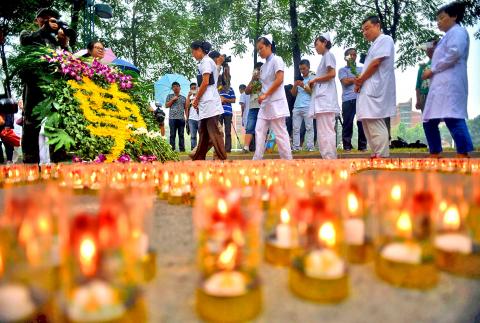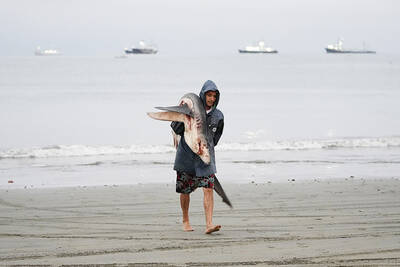Thunderstorms yesterday complicated recovery efforts from last week’s massive explosions at a warehouse in China’s Tianjin port that killed at least 114 people, left 57 missing and exposed dangerous chemicals — including some that could become flammable on contact with water.
Experts have expressed concern that rain could spread some of the vast quantities of hazardous material at the site or set off chemical reactions sparking further explosions. Rain began falling mid-morning, but there was no immediate word of new blasts.
The storms began shortly after residents, firefighters, police, medical staff and officials held a moment of silence marking the sixth day since the disaster, the first observance in the 49-day traditional Chinese mourning cycle. Sirens wailed and car and boat horns blared while assembled groups bowed in respect for the dead.

Photo: Reuters
At the now-evacuated Seaport City housing complex, 33-year-old Fan Jie joined other residents in lighting candles for first-responders killed in the explosions.
“There were many firefighters who went into the blast and sacrificed themselves. So we’re here today for them, to give thanks to them and grieve for them,” Fan said.
As of yesterday, 50 firefighters were confirmed killed and another 52 were among the 57 missing, marking the disaster as the deadliest ever for Chinese first-responders. About 1,000 firefighters responded to the disaster.
The blasts originated at a warehouse for hazardous material, where 635 tonnes of sodium cyanide — a toxic chemical that can form combustible substances on contact with water — was being stored in amounts that violated safety rules. That has prompted contamination fears and a major cleanup of a 3km-radius, cordoned-off area in the port city southeast of Beijing.
Cyanide contamination was found at levels up to 28 times those considered safe at eight of 29 testing sites within the blast zone, Tianjin Environmental Bureau chief engineer Bao Jingling (包景嶺) told reporters.
No unsafe levels were found at 14 inspection sites outside the zone, he said.
“If the rain gets heavy, water will have to be drained. It is not good for water to remain in the craters,” Bao told a news conference, referring to massive cavities left by the explosions.
Officials have said there have been no substantial leaks of the toxic sodium cyanide. They say they have sealed all waterways leading into the sea from the blast site and built retaining walls to prevent any runoff.
Sodium cyanide can form a flammable gas upon contact with water, and several hundred tonnes would be a clear violation of rules cited by state media that the warehouse could store no more than 10 tonnes at a time.
The Chinese Ministry of Industry and Information Technology has ordered authorities at all levels to check whether companies that produce and store hazardous materials comply with safety regulations, including if they are a safe distance from residential areas and do not exceed storage limits.
China’s Cabinet, the Chinese State Council, said an investigation team has launched a probe into the explosion.
Media reports say 10 people have been taken into custody, including top officials of the warehouse’s management company.
In unusually strong language, the Cabinet referred to the blasts as an “especially major fire and explosion incident.”
Along with the cause, the probe is to identify those responsible and provide recommendations on how to deal with them.
Prosecutors previously have said they would investigate any dereliction of duty and abuse of power that may have contributed to the blasts.

WAKE-UP CALL: Firms in the private sector were not taking basic precautions, despite the cyberthreats from China and Russia, a US cybersecurity official said A ninth US telecom firm has been confirmed to have been hacked as part of a sprawling Chinese espionage campaign that gave officials in Beijing access to private texts and telephone conversations of an unknown number of Americans, a top White House official said on Friday. Officials from the administration of US President Joe Biden this month said that at least eight telecommunications companies, as well as dozens of nations, had been affected by the Chinese hacking blitz known as Salt Typhoon. US Deputy National Security Adviser for Cyber and Emerging Technologies Anne Neuberger on Friday told reporters that a ninth victim

Russia and Ukraine have exchanged prisoners of war in the latest such swap that saw the release of hundreds of captives and was brokered with the help of the United Arab Emirates (UAE), officials said on Monday. Ukrainian President Volodymyr Zelenskiy said that 189 Ukrainian prisoners, including military personnel, border guards and national guards — along with two civilians — were freed. He thanked the UAE for helping negotiate the exchange. The Russian Ministry of Defense said that 150 Russian troops were freed from captivity as part of the exchange in which each side released 150 people. The reason for the discrepancy in numbers

A shark attack off Egypt’s Red Sea coast killed a tourist and injured another, authorities said on Sunday, with an Italian Ministry of Foreign Affairs source identifying both as Italian nationals. “Two foreigners were attacked by a shark in the northern Marsa Alam area, which led to the injury of one and the death of the other,” the Egyptian Ministry of Environment said in a statement. A source at the Italian foreign ministry said that the man killed was a 48-year-old resident of Rome. The injured man was 69 years old. They were both taken to hospital in Port Ghalib, about 50km north

MISSING: Prosecutors urged the company to move workers out of poor living conditions to hotels, but residents said many workers had already left the town Brazil has stopped issuing temporary work visas for BYD, the Brazilian Ministry of Foreign Affairs said on Friday, in the wake of accusations that some workers at a site owned by the Chinese electric vehicle producer had been victims of human trafficking. The announcement came days after labor authorities said they found 163 Chinese workers who had been brought to Brazil irregularly in “slavery-like” conditions at the BYD factory construction site in the northeastern state of Bahia. The workers were employed by contractor Jinjiang Group, which has denied any wrongdoing. Later, the authorities also said the workers were victims of human trafficking,